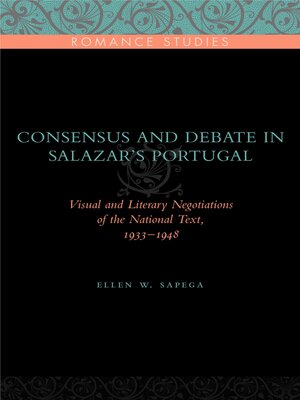Consensus and Debate in Salazar's Portugal
ebook ∣ Visual and Literary Negotiations of the National Text, 1933–1948 · Penn State Romance Studies
By Ellen W. Sapega

Sign up to save your library
With an OverDrive account, you can save your favorite libraries for at-a-glance information about availability. Find out more about OverDrive accounts.
Find this title in Libby, the library reading app by OverDrive.



Search for a digital library with this title
Title found at these libraries:
| Library Name | Distance |
|---|---|
| Loading... |
Ellen Sapega's study documents artistic responses to images of the Portuguese nation promoted by Portugal's Office of State Propaganda under António de Oliveira Salazar. Combining archival research with current theories informing the areas of memory studies, visual culture, women's autobiography, and postcolonial studies, the author follows the trajectory of three well-known cultural figures working in Portugal and its colonies during the 1930s and 1940s.
The book begins with an analysis of official Salazarist culture as manifested in two state-sponsored commemorative events: the 1938 contest to discover the "Most Portuguese Village in Portugal" and the 1940 Exposition of the Portuguese-Speaking World. While these events fulfilled their role as state propaganda, presenting a patriotic and unambiguous view of Portugal's past and present, other cultural projects of the day pointed to contradictions inherent in the nation's social fabric. In their responses to the challenging conditions faced by writers and artists during this period and the government's relentless promotion of an increasingly conservative and traditionalist image of Portugal, José de Almada Negreiros, Irene Lisboa, and Baltasar Lopes subtly proposed revisions and alternatives to official views of Portuguese experience.
These authors questioned and rewrote the metaphors of collective Portuguese and Lusophone identity employed by the ideologues of Salazar's Estado Novo regime to ensure and administer the consent of the national populace. It is evident, today, that their efforts resulted in the creation of vital, enduring texts and cultural artifacts.







